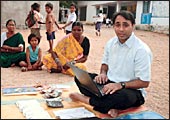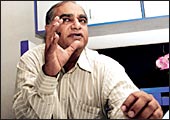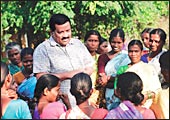|
Every
sunrise sector depends on talented and innovative individuals
to cut the path that others subsequently follow. This has been
the norm in every sector. Microfinance is no different. At a time
when the regulatory architecture for the sector is still very
hazy and last-mile connectivity a major hurdle for large players,
there are a handful of people who are braving the odds to push
forward their vision of an empowered rural India. All the individuals
profiled below are highly qualified and mostly foreign-educated.
All of them could have got cushier jobs in big cities, but each
of them chose to get his/her hands dirty in the boondocks of the
Indian hinterland because they saw potential at the bottom of
the pyramid. Their paths are different. ICICI Bank's Nachiket
Mor pioneered a new model that allowed large banks such as his
employer to enter the microfinance sector. Some others had to
borrow money from friends, family and foreign donors to start
their ventures. But these are teething troubles that all pioneers
face. The important thing is that they've opened up a sector that
can, potentially, change the face of India's rural heartland.
Nachiket Mor/42
Deputy Managing Director, ICICI Bank.
 |
| ICICI Bank's Mor: Made microfinance
bankable |
He is credited
with opening the floodgates for this sector. Mor's partnership
model, wherein the role of microfinance institutions (MFIs) changed
from holders of assets to servicing agents, transformed the sector
by removing the hurdle to its growth-the small size of MFI balance
sheets. Under this model, the loan documentation is done in the
names of the bank and the borrower; the MFI is merely a service
provider who disburses and collects money as an agent in exchange
for a service fee. This allows even small MFIs, with very small
balance sheets, to become partners in the process. Other banks
such as HDFC Bank and UTI Bank have also experimented with this
model. Result: the total loan outstanding of the top 20 MFIs grew
215 per cent in 2004 to Rs 423.77 crore when the benefits of the
partnership model kicked in, compared to Rs 134.43 crore in the
previous year. The growth rate in the previous three years had
been 56 per cent, 73 per cent and 87 per cent, respectively. Little
wonder, then, that this is called the "Nachiket Effect"
in microfinance circles. ICICI Bank now has 102 such partners
through whom it manages its microfinance portfolio. However, new
RBI norms seem to place a question mark on this model; the final
word has not yet been said on the matter. Mor, a PhD in Economics
from the University of Pennsylvania and an MBA from the Indian
Institute of Management, Ahmedabad, has been a member of ICICI
Bank's Board of Directors since 2001.
 |
| SKS's Akula: His MFI has
183 branches, and he's found mention in Time |
Vikram Akula/38
Founder and CEO, SKS Microfinance
He was only three
years old when he left Hyderabad and moved with his parents to
the US where he stayed for years. Back in Andhra Pradesh since
1997, he now manages to speak good Telugu, albeit with a heavy
American accent, with his staff. Akula, who has done a stint as
a consultant with McKinsey & Company, figures in Time magazine's
list of 100 most influential people this year. His is a quaint
story. He raised $50,000 in 1996, by hosting tea parties for about
356 friends and relatives in the US, and set up SKS. Today, his
MFI has gathered enough critical mass to catch the attention of
ace venture capitalist Vinod Khosla, who has invested in its equity.
SKS, with 183 branches spread across 11 states, has disbursed
Rs 484 crore, and is among the fastest growing microfinance organisations
in the world. Its growth in the last fiscal year: 160 per cent;
this is expected to touch 200 per cent this year. Akula is a PhD
in Political Science from the University of Chicago, has a Masters
degree in International Relations from Yale University, a Bachelor's
degree in Philosophy and English from Tufts University, and he
has also attended a graduate programme on religion at Harvard.
G. Padmaja Reddy/38
Founder Director, Spandana
 |
| Spandana's Reddy: Is aiming
for a client base of three million in five years |
Reddy founded
Spandana as an NGO in 1997 and converted it into an NBFC in 2004.
This MFI has grown rapidly, its disbursals rising from Rs 4 lakh
in 1998 to Rs 89.4 crore in 2004 (when it became an NBFC) to Rs
639 crore in March 2006. Cumulatively, it has disbursed about
Rs 1,470 crore to 850,000 clients. Reddy now wants to attract
more professionals into the company and is also keen on roping
in a strategic equity investor. "I want someone who is serious
about expanding this business; I'm willing to offer a stake in
this venture and am also open to making organisational changes
if required," she says. This may take some time, but Reddy
is clear about her more immediate goals: disbursals of Rs 5,600
crore and a client base of three million over the next five years.
 |
| BASIX's Mahajan: Has helped
over 300,000 households |
Vijay Mahajan/52
Founder Chairman, BASIX
Vijay Mahajan
is considered the veteran of the Indian microfinance world. His
professors at IIM-A, Ravi Matthai and Ranjit Gupta, founders of
IIM-A's Jawaja Rural Development Project, opened his eyes to the
potential of the sector. In 1983, Mahajan established, PRADAN
(Professional Assistance for Development Action), an NGO that,
in 23 years, has attracted 1,200 young professionals who now work
at the grassroots level across rural India. In 1995, Mahajan,
conceptualised BASIX as a "new generation livelihood promotion
institution" and had it up and running by mid-1996. Till
April 2006, when he stepped aside as its CEO, BASIX had helped
support over 300,000 households in agriculture and non-farm activities
and extended micro-credit worth over Rs 650 crore. Mahajan clarifies
that BASIX goes well beyond micro-credit and is meant to offer
a "triad" of livelihood promotion services (including
savings and insurance services, agricultural and business development
services and institutional development services) to rural producer
groups. Mahajan is an alumnus of IIT Delhi, IIM Ahmedabad and
the Woodrow Wilson School of Public International Affairs at Princeton
University.
M. Udaia Kumar/48
Founder & Managing Director, Share Microfin
 |
| Share's Kumar: In 1992,
no one was willing to lend him money. Today, he has one million
clients |
Ours is the world's
sixth-largest microfinance programme," booms Kumar. It's
been a long journey. In 1992, no donors in India were willing
to lend him money. He began with no capital and a Rs 18-lakh soft
loan from Gramin Trust of Bangladesh and Asia Pacific Development
Centre, Malaysia. Today, he has one million clients and cumulative
loan disbursals of Rs 1,900 crore. Despite the setback in Krishna
district, where the offices of some leading MFIs (including his)
were sealed by the district collector for alleged unethical practices,
Kumar feels there is still scope to expand the market in Andhra;
he is also exploring the possibility of expanding into other states.
"We have to be viable and sustainable and be able to recover
our costs. To do that, we need to move to other regions as well,"
he says. Little wonder then, that his immediate goal is to cover
10 states (he is currently present in only five) in India by the
end of this financial year and expand his client base to 1.2 million.
|









